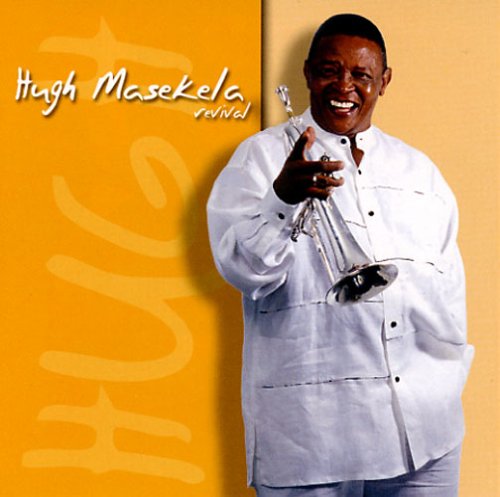
 Most
of the readers will identify the musician Hugh Masekela with his
tremendous success and number one hit "Grazin' in the Gras"
(1968). He played together with Paul Simon, Miriam Makeba, Abdullah
Ibrahim, Patti Austin, Santana, Bill Cosby, Ella Fitzgerald, Stan
Getz, Herb Alpert, The Crusaders, Harry Belafonte, Dizzy Gillespie and
many more artists.
Most
of the readers will identify the musician Hugh Masekela with his
tremendous success and number one hit "Grazin' in the Gras"
(1968). He played together with Paul Simon, Miriam Makeba, Abdullah
Ibrahim, Patti Austin, Santana, Bill Cosby, Ella Fitzgerald, Stan
Getz, Herb Alpert, The Crusaders, Harry Belafonte, Dizzy Gillespie and
many more artists.
He published more than 30
albums and is still one of the most important jazz musicians in South
Africa. His debut album "Revival" on the Heads Up label is
recorded solely by South African musicians. Masekela is known for
music styles of Kwaito, a music style with a message, township jive,
jazz and afrobeat. ďKwaito is going to be around for a long time.
Itís going to become an integral part of South African mainstream
music. Itís the core of the feeling of todayís township youth,Ē
comments Hugh Masekela. Most of his music is entertaining or better:
This music makes fun.
After the first notes of After
Tears you smell the South African sun. But the surprise starts
in the middle of the piece when I hear reminiscences of
"Shaft". There is also a lot of fine percussion on very
edge.
On Woman Of
The Sun Hugh Masekela is the storyteller in a dialogue with the
background vocals. Talking drums are accompanying his trumpet.
Hugh Masekela often sings a simple
melody like on Spring. His vocals are
rough comparable with Joseph Shabala (Ladysmith Black Mambazo). But incomparable
is his mastership on trumpet and flugel horn.
District Six
was named the Sixth Municipal District of Cape Town in 1867. In
1966, it was declared a white area under the Group areas Act of 1950,
and by 1982, the life of the community was over. 60 000 people were
forcibly removed to barren outlying areas aptly known as the Cape
Flats, and their houses in District Six were flattened by bulldozers. The
District Six Museum is reminding at this act of cruelty. Masekela
has perfectly captured the spirit of this area. Corlea, called a
"rising star", is certainly a female singer which
deserves more attention.
Open
The Door is a flaming speech for freedom. Great vocals.
Masekela's
concept is convincing: a melody, a chorus line and a magnificent
flugel horn as shown up on Nontsokolo.
With Zwai
Bala's Fresh Air Masekela leaves
the South African area and steps into Contemporary Jazz. His muted
trumpet is breathtaking.
Smoke
is a further tune in the Kwaito-style. Masekela's story is mixed with
the muted trumpet. Excellent arrangement and interplay.
On Ibala
Lam Masekela convokes the great choir in African tradition.
Sleep
sounds like an uptempo version of Woman of the Sun. But
Masekela's song has a critical touch this time.
The
instrumental For The Love Of You has a
bit of Dr. Hook, a bit of Lou Rawls, a bit of smooth jazz, definitely
radio-like. What a groove!
The start
of Working Underground could be an old
Tavares song but Masekela's vocals reminds you: This is African Pop.
Masekela is crossing all borders of styles. One cannot pigeonhole his
music on one genre.


